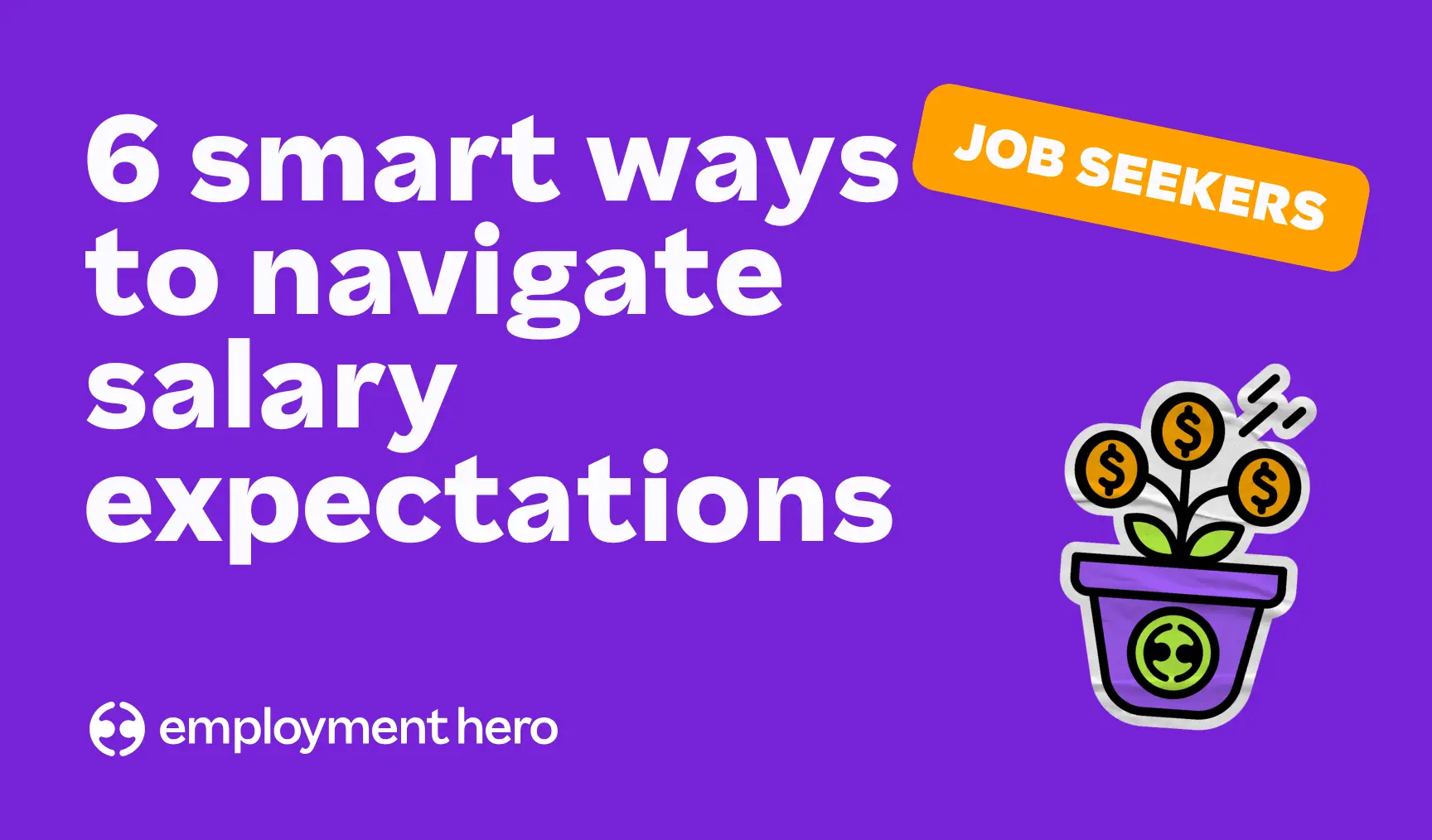How to answer salary questions in job interviews
Navigating salary expectation discussions can be a nerve-wracking experience. However, approaching these conversations with confidence and preparation can set you up for success in securing an offer that reflects your skills and value.

Contents
Navigating salary expectation discussions can be a nerve-wracking experience. However, approaching these conversations with confidence and preparation can set you up for success in securing an offer that reflects your skills and value.
For job seekers in New Zealand, understanding the nuances of local salary trends and leveraging effective negotiation strategies are key to thriving in salary discussions.
Here are six tailored strategies to help you confidently handle salary expectations in the NZ job market.
Understanding salary trends and expectations
Before negotiating your salary, it’s crucial to understand the current trends shaping New Zealand’s job market. Keeping informed about market rates helps you set realistic expectations and ensures you’re making decisions based on accurate data.
Key trends shaping salary expectations NZ:
- Strong demand for skilled professionals: Sectors like IT, healthcare, and construction are experiencing growth.
- Strong competition among job seekers: there’s a large number of people actively looking for work in NZ right now, which means competition for jobs is high.
Assessing your market value in NZ
Having a clear understanding of your worth in the job market gives you a strong foundation during salary discussions. Start by benchmarking your skills, qualifications, and industry experience against local standards.
How to assess your market value:
- Network actively: Engaging with professionals in your industry can provide deeper insights into market expectations.
- Research job listings: Take a look at listings in your industry. How much are they typically offering for roles you’re interested in?
Be sure to combine self-assessment with data from other sources to set a realistic salary range that aligns with the NZ market.
Tips to navigate salary discussions
Mastering the art of salary discussions is essential for successful negotiations.
1. Start with a collaborative mindset
Approach salary negotiations as a discussion, rather than a transaction. For instance:
“Based on the role’s requirements and my experience, I believe a salary range of $70,000 to $80,000 aligns well. I’d be happy to discuss how we can reach a range that works for us both.”
Starting the discussion with respect and openness lays the groundwork for a productive negotiation.
2. Know your worth – and back it up with research
Highlight the value you bring to the role by combining self-assuredness with research-backed insights. Outline a salary range supported by benchmarks and data:
“The standard salary range for this role is between $80,000 to $90,000. I’d be comfortable with a figure within that range – does that suit you?
3. Understand the full NZ compensation package
Salary alone is just one part of the equation. Consider the broader compensation package employers offer, which may include benefits such as:
- KiwiSaver contributions – some employers will offer to contribute more than the mandatory minimum (currently 3 percent) as an incentive for potential new hires.
- Flexible hours or remote work options
- Additional annual leave or wellness days
- Professional training and development options
Assess the entire offer holistically by clarifying what’s negotiable and included in the package.
4. Raise salary expectations early
To avoid surprises late in the process, address salary discussions during the early stages of your job interviews. Asking simple yet strategic questions can set the stage for honest conversations:
“Could you share the salary range for this role to ensure it aligns with my expectations?”
By broaching the topic early, you ensure alignment and prevent mismatched expectations.
5. Be ready to negotiate professionally
Negotiation is an ongoing process that requires preparation and poise. If the initial offer falls short, present a clear and well-reasoned counteroffer:
“I really appreciate the offer. Considering my skills and experience, I was hoping for a figure closer to $85,000. Is there flexibility to adjust the package to reflect this?”
Staying respectful and confident throughout the discussion shows professionalism.
6. Factor in KiwiSaver when comparing offers
KiwiSaver contributions can significantly impact the long-term value of a salary package. Determine if the employer offers the standard 3% contribution or a higher rate. A larger contribution can elevate the overall value of an offer, so it’s important to include this in your considerations.
Ask direct questions about whether the listed salary is inclusive or exclusive of KiwiSaver contributions.
Common mistakes to avoid in salary negotiations
Even the best-prepared candidates can stumble in salary discussions. Avoid these common pitfalls to negotiate effectively:
- Being vague: Providing unclear or noncommittal answers weakens your position.
- Underselling yourself: Don’t automatically accept offers without careful evaluation.
- Omitting benefits: Overlooking non-monetary perks could lead to undervaluing an offer.
Instead, stay specific, confident, and thorough in your approach.
Sample responses to salary questions
Strong candidates prepare well-structured responses for salary discussions. Here are examples tailored to various career levels:
- Entry-level candidate:
“I’m seeking a starting salary between $50,000 and $60,000 based on the market rates for similar roles. That said, I’m open to discussing the offer further within the context of the full package.”
- Mid-level professional:
“With my industry experience and relevant credentials, I’m aiming for a range between $80,000 and $90,000. I believe this reflects the value I can contribute to your team.”
- Senior/Executive candidate:
“This leadership role aligns with the expertise I’ve built over the years. I’m seeking a total compensation package in the $150,000 to $170,000 range, which reflects both current market trends and my proven track record.”
Final checklist for confident salary discussions
Before stepping into your next interview, use this checklist to stay prepared:
- Research market salaries and set a realistic range.
- Understand NZ’s benefits landscape, including KiwiSaver.
- Practice articulating your expectations with clarity and confidence.
- Prepare data; backed examples to justify your range.
- Keep an open mind while negotiating, balancing firmness with flexibility.
Want to land your dream job?
Navigating job interviews and salary negotiations are part of a larger career strategy. Employment Hero is here to guide you with cutting-edge tools, expert resources, and industry insights to strengthen your professional profile.
Looking for your next job? Create your profile and let the best jobs find you.
Related Resources
-
 Read more: Candidate engagement: Strategies to improve your hiring process
Read more: Candidate engagement: Strategies to improve your hiring processCandidate engagement: Strategies to improve your hiring process
Learn how businesses can build a positive candidate engagement experience.
-
 Read more: Building a strong talent pipeline: Strategies for recruiting and developing future leaders
Read more: Building a strong talent pipeline: Strategies for recruiting and developing future leadersBuilding a strong talent pipeline: Strategies for recruiting and developing future leaders
Learn how to recruit, develop, and retain quality employees who can become future leaders.
-
 Read more: 13 Creative Talent Sourcing Strategies to Expand your Talent Pool
Read more: 13 Creative Talent Sourcing Strategies to Expand your Talent Pool13 Creative Talent Sourcing Strategies to Expand your Talent Pool
Recruitment favours the proactive. Here’s how to refresh your talent sourcing strategy for 2023.





















